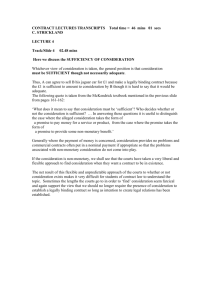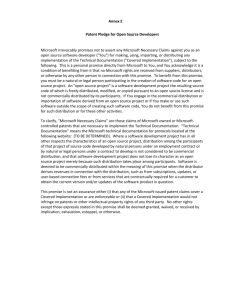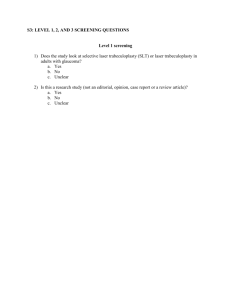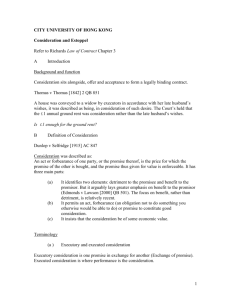Evaluation of consideration
advertisement
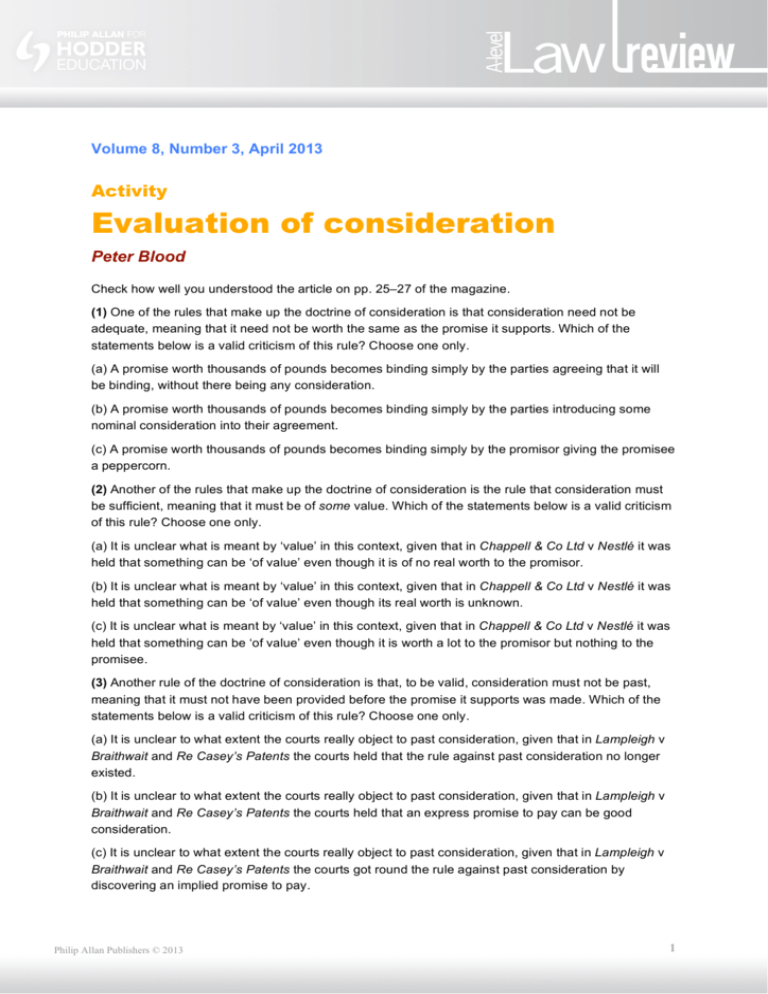
Volume 8, Number 3, April 2013 Activity Evaluation of consideration Peter Blood Check how well you understood the article on pp. 25–27 of the magazine. (1) One of the rules that make up the doctrine of consideration is that consideration need not be adequate, meaning that it need not be worth the same as the promise it supports. Which of the statements below is a valid criticism of this rule? Choose one only. (a) A promise worth thousands of pounds becomes binding simply by the parties agreeing that it will be binding, without there being any consideration. (b) A promise worth thousands of pounds becomes binding simply by the parties introducing some nominal consideration into their agreement. (c) A promise worth thousands of pounds becomes binding simply by the promisor giving the promisee a peppercorn. (2) Another of the rules that make up the doctrine of consideration is the rule that consideration must be sufficient, meaning that it must be of some value. Which of the statements below is a valid criticism of this rule? Choose one only. (a) It is unclear what is meant by ‘value’ in this context, given that in Chappell & Co Ltd v Nestlé it was held that something can be ‘of value’ even though it is of no real worth to the promisor. (b) It is unclear what is meant by ‘value’ in this context, given that in Chappell & Co Ltd v Nestlé it was held that something can be ‘of value’ even though its real worth is unknown. (c) It is unclear what is meant by ‘value’ in this context, given that in Chappell & Co Ltd v Nestlé it was held that something can be ‘of value’ even though it is worth a lot to the promisor but nothing to the promisee. (3) Another rule of the doctrine of consideration is that, to be valid, consideration must not be past, meaning that it must not have been provided before the promise it supports was made. Which of the statements below is a valid criticism of this rule? Choose one only. (a) It is unclear to what extent the courts really object to past consideration, given that in Lampleigh v Braithwait and Re Casey’s Patents the courts held that the rule against past consideration no longer existed. (b) It is unclear to what extent the courts really object to past consideration, given that in Lampleigh v Braithwait and Re Casey’s Patents the courts held that an express promise to pay can be good consideration. (c) It is unclear to what extent the courts really object to past consideration, given that in Lampleigh v Braithwait and Re Casey’s Patents the courts got round the rule against past consideration by discovering an implied promise to pay. Philip Allan Publishers © 2013 1 (4) In Williams v Roffey Brothers it was held that the performance of an existing contractual duty will constitute good consideration, provided that the other party receives a ‘practical benefit’ from the performance and there is no duress. Which of the statements below is a valid criticism of this ruling? Choose one only. (a) It is unclear what is meant by ‘practical benefit’. (b) It is unclear who must have received the ‘practical benefit’. (c) It is unclear when the ‘practical benefit’ must have been received. (5) Complete the following sentence by choosing one of the statements below: ‘Perhaps the most notorious aspect of the doctrine of consideration is the rule in Pinnel’s Case and Foakes v Beer, namely that…’ (a) ‘…a promise to accept part payment of a debt in discharge of the whole debt is not binding on the debtor.’ (b) ‘…a promise to accept part payment of a debt in discharge of the whole debt is not binding on the creditor.’ (c) ‘…a promise to accept part payment of a debt in discharge of the whole debt is binding on the creditor.’ (6) Which of the statements below most accurately reflects the effect of promissory estoppel. (a) It has abolished consideration. (b) It has abolished the rule in Pinnel’s Case and Foakes v Beer. (c) It has done neither of these things. (7) Complete the following sentence by choosing one of the statements below: ‘Because many of the problems concerning consideration arise from the fact that consideration is necessary not only to create contracts, but also to vary them, some commentators have argued that…’ (a) ‘…consideration should not be necessary when varying an existing contract.’ (b) ‘…consideration should not be necessary at the point when a contract is first made.’ (c) ‘…consideration should be necessary when making a bilateral contract, but not when making a unilateral contract.’ Philip Allan Publishers © 2013 2
